The European Blockchain Services Infrastructure (EBSI) is a network of distributed nodes across Europe that will deliver cross-border public services by the application of blockchain technology. Blockchain technology is a general purpose technology that will ultimately enhance the way citizens, governments and businesses interact.
EBSI is the result of the European Blockchain Partnership, which is established by a declaration signed between 27 Member States (including Belgium), Liechtenstein and Norway to cooperate in the delivery of cross-border digital public services, with the highest standards of security and privacy.
EBSI is one of the Connecting Europe Facility (CEF) Building Blocks, providing free reusable software, specifications and services to support the adoption of blockchain technology by the EU institutions, public administrations, business and citizens
More information? See EBSI-website (CEF Digital Connecting Europe)
Notarization
The power of blockchain is being leveraged to create trusted digital audit trails, automate compliance checks and prove data integrity.
ESSIF
EBSI is helping to implement a Self-Sovereign Identity model in Europe, allowing users to create and control their own identity across borders.
Diploma
Citizens gain digital control of their educational credentials, significantly reducing verification costs and improving trust in documents’ authenticity.
Trusted Data Sharing
Blockchain technology is being used to securely share data (e.g. IOSS VAT) among customs and tax authorities in the EU.
Social Security Passport
(to be added)
Asylum
(to be added)
SME support
(to be added)
EBSI-network

The European Blockchain Service Infrastructure provides a common, shared, and open infrastructure based on blockchain technologies aimed at providing a secure and interoperable ecosystem that will enable the development of cross-border digital services in the public sector.
EBSI will be built as a "public permissioned" blockchain where nodes will be managed by the European Commission, the European Member States or associated countries, and access will be publicly allowed to the private sector and civil society for the set of data and information that are aimed at such players. Other data access may be reserved exclusively to government bodies in order to support cross-border services.
EBSI will nevertheless be "Permissioned" as access will be based on identity, authorization, and access according to an access control policy to be able to perform an action on the Blockchain. Not all nodes on EBSI will necessarily have a write permission.
EBSI consist currently of 25 live production nodes, including the 2 Belgian nodes at Belnet and Smals and 11 nodes in setup phase. With EBSI v2.0 released and implemented end of Q1 2020 an important milestone will be achieved to bring the current and new use cases into production.
EBSI-timeline

